Author: Hashim Qureshi
Publisher: Iqra Publications, Srinagar
Year of Publication: 2011 2nd Edition
Pages: 500 Price: Rs 500
Reviewed by Mushtaq Ul Haq Ahmad Sikander
The struggle for freedom and resistance against the occupiers in Kashmir in contemporary times goes back to the partition of the subcontinent. The creation of Pakistan and a Free India brought innumerable miseries for the inhabitants of the formerly Princely State of Jammu & Kashmir. The claims and counter claims about Kashmir by both the countries ultimately led to the partition of the state with the conflict still raging hot and cold in various phases. The political dimension of the conflict still drives the resistance in the Indian Held part of the Kashmir. The state has produced various stalwarts of resistance since 1947, some have shot to fame, others remain in oblivion, many are unsung heroes while as some have been branded as dubious, suspicious or double agents owing to their political stance. Hashim Qureshi is one such stalwart who falls in the last category. Qureshi who is of the Ganga Hijacking fame is one of his rare kinds, being a resistance leader as well as a writer.
The present book under review contains his numerous essays, press release statements, articles and interviews that he gave and wrote over several decades. Very few resistance leaders have written about their experiences of resistance, political struggle, its ideological dimensions, waywardness, ideal course of actions, goals and future surmises. In this book we discover Qureshi not only as a political activist and leader but also as an ideologue of struggle for the State of Independent Jammu & Kashmir.
In his Foreword of the book Ex-President Supreme Court of Pakistan and Secretary General of Pakistan Socialist Party Abid Hussain Minto states “how he fought the case for Hashim Qureshi, as he was declared a spy by the state while the other members of the conspiracy were honored as freedom fighters”. He further remarks, “How the creation of Bangladesh was wrongly related to the Hijacking”. Farooq Tariq, Secretary General Pakistan Peoples Party, in his Introduction to the book states, “That these essays are a testimony of the transition of Qureshi’s political beliefs from armed struggle to civil disobedience”. Nazar Bonyari in his reflections about the book, very well notes that, “These essays are written by a person who has been a part of history making and reading these essays will make many political extremists and idealists change their views about various issues”.
Hashim Qureshi in his own introduction also reflects over various issues that has been dealt in the book. He criticizes the noted British historian, Alastair Lamb who in his book, Kashmir: A Disputed Legacy has distorted the facts about the Ganga Hijacking case, but when Hashim and others tried to rectify his grave blunder, he wasn’t ready to change his views, despite irrefutable evidence.
The essays, letters, press releases, interviews and articles all revolve around Kashmir issue and its various facets. Qureshi having spent many decades in Pakistan and Pakistan Administered Kashmir (PAK) depicts the state of its affairs and the pathetic conditions prevalent there. He also compares it with Indian Administered Kashmir (IAK) and the hypocrisy of IAK leaders.
Qureshi being one of the founders of the armed struggle in Kashmir has now graduated to being a complete pacifist. He is of the opinion that instead of Gun culture, civil disobedience will have more appeal and impact on the world opinion that will start sympathizing with Kashmir cause. Qureshi decries and laments about the waywardness of the armed insurgency in Kashmir. He maintains that there are no indigenous insurgent cadres in Kashmir, and those who are operating on ground are controlled by the ISI of Pakistan, not the other way round. He also laments about the anarchy and lack of discipline within the ranks of militants. According to Hashim the Gun has gone berserk and that is responsible for the doom of the armed insurgency in Kashmir. Hashim also relates his meetings with the ISI officials who wanted him to be a part of their plan of recruiting youth of Kashmir for receiving armed training in Pakistan and then infiltrating them back to Kashmir for fighting. When Hashim refused to be a part of their gameplan, murderous attacks were carried out against him that coerced him to leave Pakistan and migrate to Netherlands in 1986.
Various solutions of Kashmir issue, their viability and shortcomings are too discussed within the pages of the book. United Nations Resolutions over Kashmir and their present relevance are deliberated too. Hashim is vehemently opposed to Kashmir’s accession with Pakistan, as he cites the pathetic conditions of PAK, economic crises in Pakistan and various other reasons to build his argument. He also criticizes the Pakistani rulers and dictators. He is also against the Islamic roots of Kashmir struggle, where one can differ from him, though Kashmir issue being political in its nature, but religion has seeped into the issue surely and religious roots of this struggle can’t be brushed aside or even sidelined academically. He tries to surmise about the horrors of religious dimensions of Kashmir struggle by comparing it with the example of Afghanistan, where after the leaving of USSR troopers the various outfits of Mujahideen began infighting among themselves. He is also against the foreigners fighting in Kashmir, because he thinks they will turn Kashmir into Afghanistan too. Hashim is also opposed to division of the state of J&K on communal lines that according to him, will once again lead to bloody communal riots for which huge number of innocent Kashmir will have to pay the price. Hashim tries to be a champion of syncretic and plural culture of Kashmir that he wrongly terms as Kashmiriyat, whereas the real and proper term for the same is Rishism. Various tragedies like burning of Charar e Sharif shrine and other such political blunders have been discussed too. In one of his hard hitting essays Hashim holds the stalwart resistance leader and Chairman Jammu & Kashmir Liberation Front (JKLF) Amanullah Khan responsible for the hanging of Muhammad Maqbool Bhat in Tihar jail, in the aftermath of assassination of Indian Diplomat Ravinder Mahrate in London, by JKLF cadres as alleged by Qureshi.
In his various analytical essays and articles Hashim lucidly explains the reasons for the initiation of armed struggle in Kashmir against India, and comes down heavily against the policies of Indian State viz a viz Kashmir, that have always alienated Kashmiris and generated anger, resentment, resistance and violence among them. He also discusses the economic viability and richness of Kashmir, its resource potential and how that remains yet untapped and in oblivion. Although Hashim stands for Independent state of Jammu and Kashmir and wants Kashmiris to be included in every decision related to their future, but he offers a novel advice and puts forward a unique solution about Kashmir Issue. According to Hashim, for at least twenty years Kashmir Issue must be freezed between India and Pakistan, and then some solution must be doled out. But this solution appears to put Kashmir issue on the backburner and would in no way help solve it or put an end to the miseries of its unfortunate inhabitants and their political uncertainty.
Hashim whereas criticizing leaders of both India and Pakistan, doesn’t forget the leaders and people of Kashmir. He laments about the fact of internal divisions among the people of the state that has resulted in the evasion of a permanent solution. He vehemently criticizes the Pandit minority of Kashmir valley most of whom have aligned with the mainstream India, rather than standing shoulder to shoulder with their Muslim majority brothers. Despite this factual reality Hashim is pained by their mass migration and wants them to return back, though he appears to be naïve when he puts forward the claim that Kashmiri struggle for right of self determination will become acceptable only when Pandits will join the same, that he himself is aware would never happen, hence contradicting his own previous stance. He also condemns the silence of Jammu people in not condemning the atrocities committed against the Kashmiris by the Indian State, while at the same time he very well states that Indians aren’t following the teachings of their father of Nation Mahatma Gandhi when they are committing atrocities against common people everywhere.
The section of press conferences and interviews also throws light over various dimensions of Kashmir issue. Also the book contains a wealth of material related to the Ganga Hijacking episode and its aftermath that is a testimony of the fact that this Hijacking was an indigenous act not carried out at the behest of any of the two countries.
Also these documents relate how Pakistani authorities made Hashim and Ashraf burn the aeroplane. This new evidence thus dispels many conspiracy theories and rumors about the Hijacking case.
Overall the book is an essential read for anyone interested in the contemporary history, events, role of India and Pakistan in Kashmir. It is mandatory for those who want to introspect about the resistance movement and what went wrong. It is disturburing, as it destroys numerous illusions, utopias and myths related with Kashmir issue. The iconoclastic figure of Hashim becomes more evident in this book. Don’t read this book if you are an idealist, but do read it if you want to face the reality. This book is certainly destined to awake you from your dreams and come to terms with brutal reality and bizarre facts.
Mushtaq Ul Haq Ahmad Sikander is Writer-Activist based in Srinagar, Kashmir and can be reached at sikandarmushtaq@gmail.com .
Box
The section of press conferences and interviews also throws light over various dimensions of Kashmir issue. Also the book contains a wealth of material related to the Ganga Hijacking episode and its aftermath that is a testimony of the fact that this Hijacking was an indigenous act not carried out at the behest of any of the two countries.



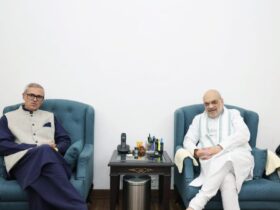

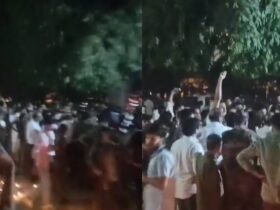
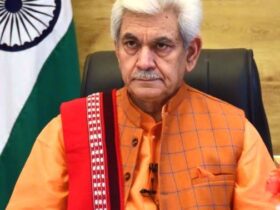


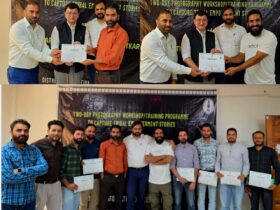
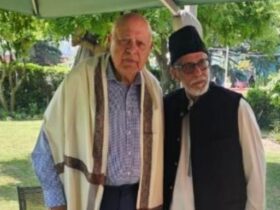

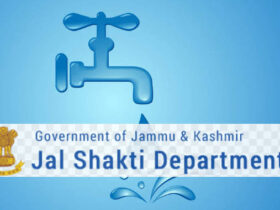




Leave a Reply